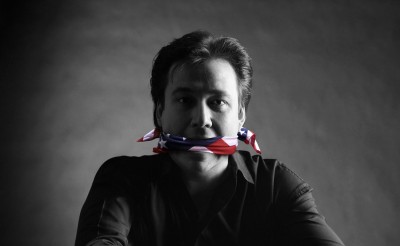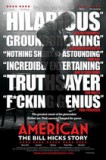| Reviews & Columns |
|
Reviews DVD TV on DVD Blu-ray 4K UHD International DVDs In Theaters Reviews by Studio Video Games Features Collector Series DVDs Easter Egg Database Interviews DVD Talk Radio Feature Articles Columns Anime Talk DVD Savant Horror DVDs The M.O.D. Squad Art House HD Talk Silent DVD
|
DVD Talk Forum |
|
|
| Resources |
|
DVD Price Search Customer Service #'s RCE Info Links |
|
Columns
|
|
|
American: The Bill Hicks Story

For comedy fans, the untimely death of Bill Hicks was tragic on a human level, yes, but also on a selfish one: How many hours of brilliant material were we robbed of? Here is a comic who seemed to be just getting going, having honed his uniquely bristling satiric voice over years of nightclub work (and hard living), and then he was gone, dead of pancreatic cancer at a mere 32 years old. In the years since, Hicks has become one of the most vaunted and idolized figures in the world of stand-up comedy. And now there is a new documentary, American: The Bill Hicks Story, which looks at his brief life and legacy with skill and insight.
Directors Matt Harlock and Paul Thomas tell Hicks's story entirely through the memories of those who were close to him--his family, his friends, his fellow comics. There is no narration, and precious few talking head shots; most of the interviews are voice-over accompaniment to a kind of cut-and-paste animation photomontage, in which photographs are brought to life as illustration (you've seen similar techniques in documentaries like The Kid Stays in the Picture). They trace his childhood, moving from place to place in a strict, religious family (of the narrative that Bill was raised as a fundamentalist Christian, his brother jokes, "We were raised Southern Baptist, and that's much worse"), but fascinated from a very young age by the business of show and the world of comedy. He and friend Dwight Slade begin performing as a comedy team, first at school and then at a Houston nightclub; when Slade moves away, Hicks goes it alone, and we're treated to video of the impossibly young-looking teenager on stage.
He began as a very different kind of performer--"never swore," Slade says. "He was the clean-cut comic." After a brief move to Los Angeles, Hicks returned to Texas and began to develop his comic voice--and his vices, using mind-altering drugs and drink to shed his inhibitions and open up his mind. And then, suddenly, there it is: a miraculous clip of the Hicks we know (or closer to it, anyway), a cauldron of barely-contained rage, spewing bile that is as hard and mean as it is riotously funny.
What made Hicks genuinely dangerous, an honest-to-God (pardon the cliché) edgy comic, was his seeming disinterest in being a light entertainer, a fluff purveyor of tired bits and well-worn comic tropes. He wanted to provoke his audiences, to make them think, to make them question, to make them mad--but to do so in a satirical style that never (okay, seldom) sacrificed laughs. In that way, he was perhaps the only modern-era comic who honestly earned comparison to Lenny Bruce; he held up a mirror to his audience, and wasn't afraid to make them uncomfortable to make a point.
If it held no other value, American would be worth seeing for its consideration of his creative journey--for how keenly it understands and articulates what it took to get him there, how he could have gone wrong ("Club owners were concerned about how erratic the shows would be"), and how he didn't. The people who knew him, his friends and colleagues, prove the best voices for understanding why he was important: what he did, how he did it, why it was different, and why he had such difficulty with his audiences.
Harlock and Thomas wisely select his most timeless material, bits covering topics that are still relevant: creationism, anti-intellectualism, gays in the military. The best sequences, not surprisingly, are the performances; they're still raw and cagey and alive. The animated photo technique mostly works, though a few of the visual choices are a little trite (like the point-of-view shot stumbling down a sketchy alley during his drunken period). If there's a problem with the device, it's that it's used so heavily that we don't get much chance to connect the somewhat disembodied voices with the people who are originating them; it's one thing to keep the subject off-screen when there's only one narrator (as in The Kid Stays in the Picture); American requires a bit more detective work out of the viewer than it should.
And it should be noted that the film is pretty conventional from a structural standpoint; it doesn't look to replicate its subject's innovativeness. But the content is, by a good stretch, intriguing enough to keep us engaged. This is especially true in the closing sections, after he received his diagnosis, but told few people and kept working (now with even more purpose). There's a power to those performances, a sense of wanting to say what he could while he could, and the filmmakers wisely let him speak mostly for himself. That's the smart play. His words continue to inspire and provoke, and American: The Bill Hicks Story is an affecting and compelling tribute.
Jason lives in New York. He holds an MA in Cultural Reporting and Criticism from NYU.
|
| Popular Reviews |
| Sponsored Links |
|
|
| Sponsored Links |
|
|
| Release List | Reviews | Shop | Newsletter | Forum | DVD Giveaways | Blu-Ray | Advertise |
|
Copyright 2024 DVDTalk.com All Rights Reserved. Legal Info, Privacy Policy, Terms of Use,
Manage Preferences,
Your Privacy Choices | |||||||











